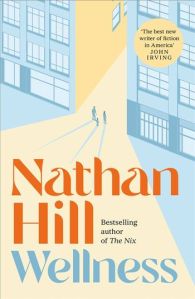 Wellness by Nathan Hill is set in the 1990s when Jack and Elizabeth meet as college students amid a vibrant art scene in Chicago. The novel follows the ups and downs of their relationship over the next 20 years through to middle age when they are married with a young son. Jack is a photographer while Elizabeth works at a wellness lab specialising in using placebos to treat disorders. The character development is exceptionally detailed, although some of the deep dives about psychology and algorithms could have been a little more concise. Still, unlike most doorstopper novels which deal with complex social issues – ‘Wellness’ is a hefty 600+ pages – it doesn’t take itself too seriously thanks to Hill’s sharp eye for humour and cynicism. I enjoyed Hill’s debut The Nix a lot and his second novel doesn’t disappoint. Many thanks to Pan Macmillan for sending me a review copy via NetGalley. Continue reading
Wellness by Nathan Hill is set in the 1990s when Jack and Elizabeth meet as college students amid a vibrant art scene in Chicago. The novel follows the ups and downs of their relationship over the next 20 years through to middle age when they are married with a young son. Jack is a photographer while Elizabeth works at a wellness lab specialising in using placebos to treat disorders. The character development is exceptionally detailed, although some of the deep dives about psychology and algorithms could have been a little more concise. Still, unlike most doorstopper novels which deal with complex social issues – ‘Wellness’ is a hefty 600+ pages – it doesn’t take itself too seriously thanks to Hill’s sharp eye for humour and cynicism. I enjoyed Hill’s debut The Nix a lot and his second novel doesn’t disappoint. Many thanks to Pan Macmillan for sending me a review copy via NetGalley. Continue reading
Tag Archives: Literary Fiction
Books I Read in January 2024
Filed under Books
My Most Anticipated Books of 2024
My list of books to read continues to expand and there are lots to look forward to in 2024. All publication dates where known apply to the United Kingdom only.
Wellness by Nathan Hill is published in January. I really enjoyed Hill’s debut novel The Nix and his second book is another 600+page doorstopper about a couple who meet in Chicago in the 1990s. Another second novel out in January is Come and Get It by Kiley Reid set on a university campus in the United States. Continue reading
My Books of the Year 2023
One of the stand-out novels I read in 2023 was Romantic Comedy by Curtis Sittenfeld which is a fun and refreshingly original take on the genre. I also really enjoyed The Running Grave by Robert Galbraith which is the seventh outing for Cormoran Strike and Robin Ellacott’s detective agency as they infiltrate a sinister cult in Norfolk. Continue reading
Filed under Books
Books I Read in September 2023
 The Fraud by Zadie Smith weaves together three storylines based on true events in the 19th century. A Cockney butcher arrives in London from Australia claiming to be Sir Roger Tichborne, the heir to a baronetcy and previously thought to have been lost at sea. His sensational fraud trial in London captures everyone’s attention, including Eliza Touchet, the cousin-by-marriage of prolific novelist William Ainsworth who outsold Charles Dickens in his day, and Andrew Bogle, a former Jamaican slave who believes the claimant really is Tichborne despite a considerable amount of evidence that he definitely isn’t. ‘The Fraud’ is Smith’s long-awaited first piece of long-form historical fiction, but ultimately I prefer her contemporary novels. It is an original take on a forgotten case with some humorous dialogue and parallels with more recent events in the US. However, I think it was held back by its overly complex structure scattered across very short chapters, with the three strands never quite hanging together in a coherent or satisfying way (much like my issue with To Paradise by Hanya Yanagihara). Many thanks to Penguin UK, Hamish Hamilton for sending me a review copy via NetGalley. Continue reading
The Fraud by Zadie Smith weaves together three storylines based on true events in the 19th century. A Cockney butcher arrives in London from Australia claiming to be Sir Roger Tichborne, the heir to a baronetcy and previously thought to have been lost at sea. His sensational fraud trial in London captures everyone’s attention, including Eliza Touchet, the cousin-by-marriage of prolific novelist William Ainsworth who outsold Charles Dickens in his day, and Andrew Bogle, a former Jamaican slave who believes the claimant really is Tichborne despite a considerable amount of evidence that he definitely isn’t. ‘The Fraud’ is Smith’s long-awaited first piece of long-form historical fiction, but ultimately I prefer her contemporary novels. It is an original take on a forgotten case with some humorous dialogue and parallels with more recent events in the US. However, I think it was held back by its overly complex structure scattered across very short chapters, with the three strands never quite hanging together in a coherent or satisfying way (much like my issue with To Paradise by Hanya Yanagihara). Many thanks to Penguin UK, Hamish Hamilton for sending me a review copy via NetGalley. Continue reading
Filed under Books
Books I Read in July 2023
 Stasiland by Anna Funder won the Samuel Johnson Prize for Non-Fiction in 2004 (now known as the Baillie Gifford Prize) and chronicles the lives of several people who lived in the German Democratic Republic, also known as East Germany, during the Cold War. Funder, an Australian journalist, was working in television in the mid-1990s when she put an ad in a newspaper seeking stories from those who experienced life under the Stasi regime. They include Miriam who was caught trying to cross the Berlin Wall as a teenager, Julia whose Italian boyfriend raised suspicion among Stasi officers, and Frau Paul whose baby son was taken to a west Berlin hospital on the night the Wall was constructed leaving her stuck on the other side after refusing to inform for the Stasi. Funder also spoke to former Stasi officers, some of whom remained sympathetic to the regime. The number of Stasi officers and informants – estimated to be as high as 1 in 6.5 of the population – is staggering and their methods of surveillance, control and manipulation even more so. Given Funder collected these stories not long after the Wall fell, ‘Stasiland’ is an important collection of eyewitness accounts told by those who had recently lived through such a turbulent time. Continue reading
Stasiland by Anna Funder won the Samuel Johnson Prize for Non-Fiction in 2004 (now known as the Baillie Gifford Prize) and chronicles the lives of several people who lived in the German Democratic Republic, also known as East Germany, during the Cold War. Funder, an Australian journalist, was working in television in the mid-1990s when she put an ad in a newspaper seeking stories from those who experienced life under the Stasi regime. They include Miriam who was caught trying to cross the Berlin Wall as a teenager, Julia whose Italian boyfriend raised suspicion among Stasi officers, and Frau Paul whose baby son was taken to a west Berlin hospital on the night the Wall was constructed leaving her stuck on the other side after refusing to inform for the Stasi. Funder also spoke to former Stasi officers, some of whom remained sympathetic to the regime. The number of Stasi officers and informants – estimated to be as high as 1 in 6.5 of the population – is staggering and their methods of surveillance, control and manipulation even more so. Given Funder collected these stories not long after the Wall fell, ‘Stasiland’ is an important collection of eyewitness accounts told by those who had recently lived through such a turbulent time. Continue reading
Filed under Books
The Booker Prize 2023 Longlist
 The Booker Prize longlist was announced on Tuesday. The 13 titles are:
The Booker Prize longlist was announced on Tuesday. The 13 titles are:
A Spell of Good Things by Ayọ̀bámi Adébáyọ̀
Old God’s Time by Sebastian Barry
Study for Obedience by Sarah Bernstein
If I Survive You by Jonathan Escoffery
How to Build a Boat by Elaine Feeney
This Other Eden by Paul Harding
Pearl by Siân Hughes
All the Little Bird-Hearts by Viktoria Lloyd-Barlow
Prophet Song by Paul Lynch
In Ascension by Martin MacInnes
Western Lane by Chetna Maroo
The Bee Sting by Paul Murray
The House of Doors by Tan Twan Eng
Filed under Books
The Booker Prize 2023: Predictions, Possibilities and Preferences
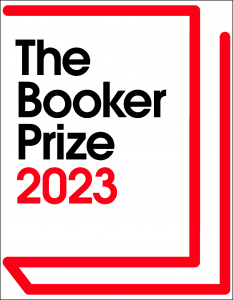 In my Booker Prize blog post last year, I noted that my longlist predictions lists in 2020 and 2021 included the eventual winners in those years: Shuggie Bain by Douglas Stuart and The Promise by Damon Galgut. I posed the question of whether I could make it three years in a row. The answer was a resounding no, but I think it’s fair to say that last year’s winner The Seven Moons of Maali Almeida by Shehan Karunatilaka didn’t feature in too many other predictions lists either, so I guess that was a small consolation.
In my Booker Prize blog post last year, I noted that my longlist predictions lists in 2020 and 2021 included the eventual winners in those years: Shuggie Bain by Douglas Stuart and The Promise by Damon Galgut. I posed the question of whether I could make it three years in a row. The answer was a resounding no, but I think it’s fair to say that last year’s winner The Seven Moons of Maali Almeida by Shehan Karunatilaka didn’t feature in too many other predictions lists either, so I guess that was a small consolation.
As ever, my annual list of predictions consists of what I think could be some strong possibilities alongside my own personal preferences, based on a few novels I have read and others I have heard about. Novels published in the UK between 1 October 2022 and 30 September 2023 will be eligible. It’s impossible to know for sure which novels have been submitted for consideration, although the latest efforts by previous winners are usually considered automatically. Continue reading
Filed under Books
Books I Read in May 2023
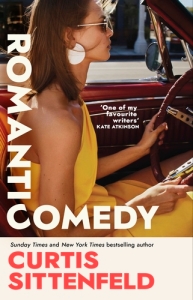 Romantic Comedy by Curtis Sittenfeld is one of my most anticipated books of 2023. Sally is a comedy writer for the late-night sketch show The Night Owls – a fictionalised version of Saturday Night Live – where she meets Noah Brewster, a pop star since the early 2000s who is appearing as a guest host. Expecting to work with a vapid and self-absorbed celebrity, Sally is pleasantly surprised when they hit it off while writing sketches. Her awkward lack of self-confidence prevents romantic developments, until they reconnect through email correspondence during the COVID-19 pandemic. The atmosphere of the male-dominated writers’ room is convincingly depicted and Sally is a refreshingly well-written female lead character who isn’t defined by her feelings about having children. Sittenfeld uses some of the traditional tropes of the romantic comedy genre, particularly around conflict, while quietly reversing others. Rather than being in competition with a rival, the only real obstacle is Sally’s low self-esteem. This is easily one of the most enjoyable books I have read this year. Continue reading
Romantic Comedy by Curtis Sittenfeld is one of my most anticipated books of 2023. Sally is a comedy writer for the late-night sketch show The Night Owls – a fictionalised version of Saturday Night Live – where she meets Noah Brewster, a pop star since the early 2000s who is appearing as a guest host. Expecting to work with a vapid and self-absorbed celebrity, Sally is pleasantly surprised when they hit it off while writing sketches. Her awkward lack of self-confidence prevents romantic developments, until they reconnect through email correspondence during the COVID-19 pandemic. The atmosphere of the male-dominated writers’ room is convincingly depicted and Sally is a refreshingly well-written female lead character who isn’t defined by her feelings about having children. Sittenfeld uses some of the traditional tropes of the romantic comedy genre, particularly around conflict, while quietly reversing others. Rather than being in competition with a rival, the only real obstacle is Sally’s low self-esteem. This is easily one of the most enjoyable books I have read this year. Continue reading
Filed under Books
The Women’s Prize for Fiction Longlist 2023
 The Women’s Prize for Fiction longlist for 2023 was announced yesterday. The 16 titles are:
The Women’s Prize for Fiction longlist for 2023 was announced yesterday. The 16 titles are:
Glory by NoViolet Bulawayo
Homesick by Jennifer Croft
Fire Rush by Jacqueline Crooks
Children of Paradise by Camilla Grudova
Stone Blind by Natalie Haynes
Trespasses by Louise Kennedy
Demon Copperhead by Barbara Kingsolver
Cursed Bread by Sophie Mackintosh
The Dog of the North by Elizabeth McKenzie
Black Butterflies by Priscilla Morris
The Marriage Portrait by Maggie O’Farrell
I’m a Fan by Sheena Patel
Pod by Laline Paull
Wandering Souls by Cecile Pin
The Bandit Queens by Parini Shroff
Memphis by Tara M Stringfellow
Filed under Books
My Most Anticipated Books of 2023
There are lots of new books due in 2023 which I’m looking forward to reading and my list continues to expand by the day. All publication dates where known apply to the United Kingdom only.
There are some promising looking debut novels out in January including Really Good, Actually by Monica Heisey loosely based on the author’s experience of getting divorced in her late 20s and We All Want Impossible Things by Catherine Newman about female friendship. Death of a Bookseller by Alice Slater is one of the most intriguing crime fiction debut titles and will be published in April. Continue reading
My Books of the Year 2022
There were three novels which really stood out for me in 2022. Case Study by Graeme Macrae Burnet was longlisted for the Booker Prize last year and skilfully presents the fictional biography of psychoanalyst Arthur Collins Braithwaite as authentic source material.
Careless by Kirsty Capes is an excellent debut novel which was longlisted for this year’s Women’s Prize for Fiction. It is about a 15-year-old girl in care who discovers that she is pregnant and Capes handles the narrative very convincingly.
I’m Sorry You Feel That Way by Rebecca Wait is a memorable novel about the impact of mental health and dysfunctional family dynamics, which sounds depressing but is written with very dry humour.
Filed under Books
The Booker Prize 2022 Longlist
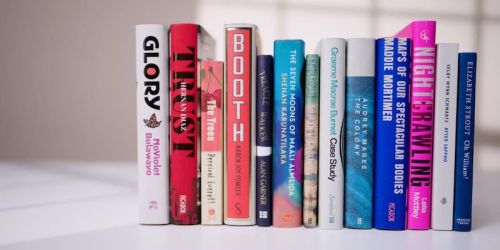 The Booker Prize longlist was announced on Tuesday. The 13 titles are:
The Booker Prize longlist was announced on Tuesday. The 13 titles are:
Glory by NoViolet Bulawayo
Trust by Hernan Diaz
The Trees by Percival Everett
Booth by Karen Joy Fowler
Treacle Walker by Alan Garner
The Seven Moons of Maali Almeida by Shahan Karunatilaka
Small Things Like These by Claire Keegan
Case Study by Graeme Macrae Burnet
The Colony by Audrey Magee
Maps of Our Spectacular Bodies by Maddie Mortimer
Nightcrawling by Leila Mottley
After Sappho by Selby Lynn Schwartz
Oh William! by Elizabeth Strout
Filed under Books
The Booker Prize 2022: Predictions, Possibilities and Preferences
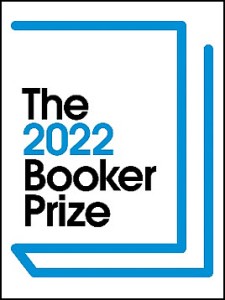 The 2022 Booker Prize longlist will be announced on Tuesday 26th July and I have made my annual list of predictions in terms of what I think could be some strong possibilities alongside my own personal preferences, based on a few novels I have read and others I have heard about. As ever, it’s impossible to know which novels have been submitted for consideration but those published in the UK between 1 October 2021 and 30 September 2022 will be eligible. My longlist predictions lists in 2020 and 2021 included the eventual winners in those years: Shuggie Bain by Douglas Stuart and The Promise by Damon Galgut. The question is, can I make it three years in a row…?
The 2022 Booker Prize longlist will be announced on Tuesday 26th July and I have made my annual list of predictions in terms of what I think could be some strong possibilities alongside my own personal preferences, based on a few novels I have read and others I have heard about. As ever, it’s impossible to know which novels have been submitted for consideration but those published in the UK between 1 October 2021 and 30 September 2022 will be eligible. My longlist predictions lists in 2020 and 2021 included the eventual winners in those years: Shuggie Bain by Douglas Stuart and The Promise by Damon Galgut. The question is, can I make it three years in a row…?
Filed under Books
The Women’s Prize for Fiction Longlist 2022

The Women’s Prize for Fiction longlist for 2022 was announced on Tuesday. The 16 titles are:
The Bread the Devil Knead by Lisa Allen-Agostini
Salt Lick by Lulu Allison
Careless by Kirsty Capes
Remote Sympathy by Catherine Chidgey
The Paper Palace by Miranda Cowley Heller
Flamingo by Rachel Elliott
The Sentence by Louise Erdrich
Build Your House Around My Body by Violet Kupersmith
Sorrow and Bliss by Meg Mason
The Exhibitionist by Charlotte Mendelson
The Book of Form and Emptiness by Ruth Ozeki
This One Sky Day by Leone Ross
The Island of Missing Trees by Elif Shafak
Great Circle by Maggie Shipstead
The Final Revival of Opal & Nev by Dawnie Walton
Creatures of Passage by Morowa Yejidé
Filed under Books
Books I Read in January
 Case Study by Graeme Macrae Burnet is set in the 1960s and consists of a fictional biography of Arthur Collins Braithwaite, a radical psychoanalyst with a practice based in north London, interweaved with notebooks written by one of his patients which have been purportedly “discovered” by her cousin and passed on to the author. The patient believes Braithwaite is responsible for the death of her elder sister, Veronica, and poses as Rebecca Smyth in order to find out more about him. As with the Booker Prize-shortlisted His Bloody Project, Burnet displays his impeccable narrative skill in presenting the story as authentic source material. There is plenty of satire in the depiction of Braithwaite’s rivalries with his contemporaries, reminiscent of the spoof biographies in Their Brilliant Careers by Ryan O’Neill, while pertinent questions about the nature of identity and reality are posed in “Rebecca’s” pursuit for answers. ‘Case Study’ is another outstanding novel by one of my must-read authors. Continue reading
Case Study by Graeme Macrae Burnet is set in the 1960s and consists of a fictional biography of Arthur Collins Braithwaite, a radical psychoanalyst with a practice based in north London, interweaved with notebooks written by one of his patients which have been purportedly “discovered” by her cousin and passed on to the author. The patient believes Braithwaite is responsible for the death of her elder sister, Veronica, and poses as Rebecca Smyth in order to find out more about him. As with the Booker Prize-shortlisted His Bloody Project, Burnet displays his impeccable narrative skill in presenting the story as authentic source material. There is plenty of satire in the depiction of Braithwaite’s rivalries with his contemporaries, reminiscent of the spoof biographies in Their Brilliant Careers by Ryan O’Neill, while pertinent questions about the nature of identity and reality are posed in “Rebecca’s” pursuit for answers. ‘Case Study’ is another outstanding novel by one of my must-read authors. Continue reading
Filed under Books
My Most Anticipated Books of 2022
My list of most anticipated books coming soon in 2022 is growing by the day, so here are some of the highlights. All publication dates where known apply to the United Kingdom only.
To Paradise by Hanya Yanagihara is out this month and spans an alternative version of New York in 1893, 1993 and 2093. I’ve heard nothing but positive reviews so far, even from those who didn’t get on with her second novel A Little Life. I expect it will appear on several predictions lists for the Booker Prize later this year, along with Young Mungo by Douglas Stuart which is out in April, after the Scottish author’s debut novel Shuggie Bain won the Prize in 2020. Continue reading
Filed under Books
Girl, Woman, Other by Bernardine Evaristo and Great Circle by Maggie Shipstead
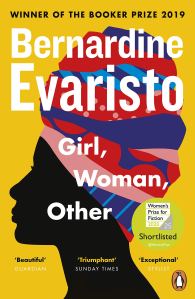 Girl, Woman, Other by Bernardine Evaristo was the joint winner of the Booker Prize in 2019 alongside The Testaments by Margaret Atwood which I read earlier this year. It follows the lives of 12 characters, mostly black British women, spanning several decades in four overlapping clusters. In the first part, we are introduced to Amma, a theatre director, her daughter Yazz, and Dominique who is Amma’s former partner in the theatre group. Then there is Carole who works in banking, her mother Bummi and her school friend La Tisha. Shirley is a teacher whose mother Winsome is retired in Barbados and has worked with her colleague Penelope for several years. Finally, Megan/Morgan is a non-binary social media influencer, whose relatives Hattie and Grace were based in the north of England in the early 20th century.
Girl, Woman, Other by Bernardine Evaristo was the joint winner of the Booker Prize in 2019 alongside The Testaments by Margaret Atwood which I read earlier this year. It follows the lives of 12 characters, mostly black British women, spanning several decades in four overlapping clusters. In the first part, we are introduced to Amma, a theatre director, her daughter Yazz, and Dominique who is Amma’s former partner in the theatre group. Then there is Carole who works in banking, her mother Bummi and her school friend La Tisha. Shirley is a teacher whose mother Winsome is retired in Barbados and has worked with her colleague Penelope for several years. Finally, Megan/Morgan is a non-binary social media influencer, whose relatives Hattie and Grace were based in the north of England in the early 20th century.
Continue reading
Filed under Books
Summer Reading: Part Two
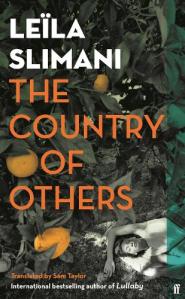 The Country of Others by Leïla Slimani, translated from the French by Sam Taylor, is the first book in a planned trilogy of historical fiction. In a very different setting and genre from Slimani’s breakout thriller Lullaby, ‘The Country of Others’ opens just after the Second World War when a Frenchwoman from Alsace, Mathilde, falls in love with Amine, a Moroccan soldier fighting for the French and moves to Morocco with him in 1946 when they get married. Mathilde raises their daughter, Aïcha, and son, Selim while Amine works on the farm, but she becomes increasingly disillusioned with her choices. Inspired by the life of Slimani’s grandmother, who also left Alsace after marrying a Moroccan soldier, ‘The Country of Others’ is a very personal project for Slimani. It suffers slightly from a lack of narrative drive, often reading as a series of vignettes, but perhaps a bigger picture will emerge as the trilogy progresses. I look forward to reading the next instalment which will be set in the 1960s. Continue reading
The Country of Others by Leïla Slimani, translated from the French by Sam Taylor, is the first book in a planned trilogy of historical fiction. In a very different setting and genre from Slimani’s breakout thriller Lullaby, ‘The Country of Others’ opens just after the Second World War when a Frenchwoman from Alsace, Mathilde, falls in love with Amine, a Moroccan soldier fighting for the French and moves to Morocco with him in 1946 when they get married. Mathilde raises their daughter, Aïcha, and son, Selim while Amine works on the farm, but she becomes increasingly disillusioned with her choices. Inspired by the life of Slimani’s grandmother, who also left Alsace after marrying a Moroccan soldier, ‘The Country of Others’ is a very personal project for Slimani. It suffers slightly from a lack of narrative drive, often reading as a series of vignettes, but perhaps a bigger picture will emerge as the trilogy progresses. I look forward to reading the next instalment which will be set in the 1960s. Continue reading
Filed under Books
























You must be logged in to post a comment.